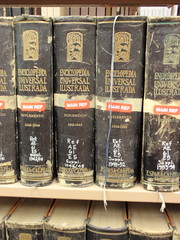Resource Profile: Reference Sources

Photo by nicolefrancine at Flickr
What is a reference source? Reference sources are print and online collections that seek to provide overviews to the concepts and resources in a given area. References sources, including books, encyclopedias, handbooks, companions, atlases, bibliographies, statistical databases, lexicons, and dictionaries, strive to be objective and provide access to the best scholarship available. Reference sources are great places to begin your research project and become familiar with a topic or concept quickly.
How are reference sources different from other kinds of sources? Reference sources tend not to be exhaustive. They are usually an amalgam of many different writers and scholars, so the quality and approach to each topic can vary, even within a single source. Also, it's important to know that, unlike regular books that circulate on the second floor, print reference sources cannot be taken out of the library.
Is there a way to tell which reference sources are better than others? Much of the same criteria used to determine the quality of books, journal articles, and magazines can be used to evaluate reference sources as well. Who publishes the source? When in doubt, gravitate toward reference sources published by the most important academic university presses (Oxford, Cambridge, etc.). How extensive are the bibliographies provided? Who writes the individual articles within a source? Is there an editorial or peer-review process involved? Any good reference source will clearly explain what this process is.
What are the features of reference sources?
- Often directed toward a broad audience that seeks a quick introduction into a given area.
- Has a brief bibliography of the most important scholarship for each topic.
- Should not be used as the only source in any project.
Wikipedia: Beneath the Surface
You probably use Wikipedia all time time as a source of information. Online reference sources like Wikipedia can be good starting places in the research process, but you need to be aware of how Wikipedia works. This video will provide more context.